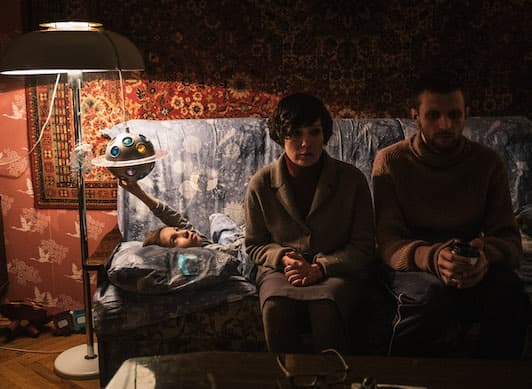Welles, Gilliam, Cronenberg, and … Serebrennikov?
Some filmmakers just have more chutzpah than others, and by tackling a film based on a novel that seems close to unfilmable, Kirill Serebrennikov joins this rank with ‘Petrov’s Flu.’

“Petrov’s Flu,” the latest film from director Kirill Serebrennikov, is an adaptation of the novel “The Petrovs in and Around the Flu,” by Alexey Salnikov.
Born in 1978, Mr. Salnikov is a poet and novelist of some repute in his native Russia. The novel was festooned with significant honors, being shortlisted for the Big Book National Literary Award in 2018 and winning the National Bestseller Award the same year.
The book also received a NOS (New Literature) critic’s prize from the Mikhail Prokhorov Foundation. Mr. Salnikov’s work has yet to be translated into English, so his accomplishments are, for the time being, intensely local, but they bear enumerating if only for the fact that photos from the NOS ceremony confirm that the award is bestowed by an enormous nose wearing a tophat and tails.
Devotees of Russian literature will have recognized the allusion to “The Nose,” a short story by Nikolai Gogol, the 19th-century writer known for his mordant take on humankind. Gogol is name-checked in “Petrov’s Flu,” and it’s fair to say that Mr. Serebrennikov follows in his footsteps. That, and he’s made a film based on a novel that might be close to unfilmable.
Mr. Serebrennikov isn’t the first to attempt a picture based on a literary source whose scale, scope, and wholesale embrace of the absurd would seem to rebuff cinematic interpretation. Mr. Serebrennikov’s countryman, Yuri Kara, adapted Mikhail Bulgakov’s “The Master and Margarita” for the screen, and directors closer to home like Orson Welles, Terry Gilliam, and David Cronenberg have done what they could with Kafka, Cervantes, and William Burroughs. Some filmmakers have more chutzpah than others.
“Petrov’s Flu” is, on its own terms, a venture as impractical as it is ambitious. Coming in at around two and a half hours, Mr. Serebrennikov’s opus is — well, let’s not call it a “workout,” but perhaps taxing. For its initial hour or so, the picture is enthralling, a headlong rush into post-Soviet Russia. The film takes us on a ride whose shifts in mise en scene are remarkably fluid given their speed and extremity. Mr. Serebrennikov, working with cinematographer Vladislav Opelyants, knows how to move a camera.
The environs on-screen are a crazy quilt of post-apocalyptic distress, Brutalist decay, bourgeois stolidity, and hallucinogenic rabbit holes. The country is undergoing a pandemic — no, not Covid but, rather, the title contagion. (Mr. Serebrennikov began filming before lockdown.) Our protagonist Petrov (Seymon Serzin) appears throughout the movie with a ghostly pallor, nasty cough, and perpetual sniffle. He doesn’t stumble about in a fever dream: The world is a fever dream.
Petrov’s wife (Chulpan Khamatova) works as a librarian, coming complete with a forbidding manner and black-rim glasses. Lest you worry she’s too much of a caricature, Petrova is also given to rough sex in the stacks, filicidal impulses, and monstrous transformations. Request one too many books on gynecology, as a library patron does, and Petrova’s eyes will likely turn black and her demeanor beastial. What genre film did she skitter in from?
Petrov and Petrova’s teenage son (Vladislav Semiletkov) is, in this context, relatively normal, though it seems he’s caught his father’s bug. Otherwise, “Petrov’s Flu” is a kaleidoscopic jumble of sexual innuendo, sociopolitical cynicism, and slippages in time and space heralded by changes in film stock and color. Oh, and let’s not forget the UFOs, an abundance of naked men, and the random round-ups of citizens who are then summarily executed.
Armchair sociologists will have their hands full in deciphering the cultural correspondences and historical resonances within the movie. Certainly, Mr. Serebrennikov casts a caustic eye on the affairs of men, and proves something of a visionary — though how much he owes to Mr. Salnikov’s imagination remains to be seen.
Would that he had crafted a less discursive film or hired a more stringent editor, as a modicum of narrative coherence would work wonders. Still, “Petrov’s Flu” is worth the trip for those willing to forgive its indulgences. Think of it as a kissing cousin to “Brazil” or a less tendentious (and considerably more entertaining) variation on “Stalker.” If you’re up for the challenge, Mr. Serebrennikov delivers above and beyond the call of excess.

